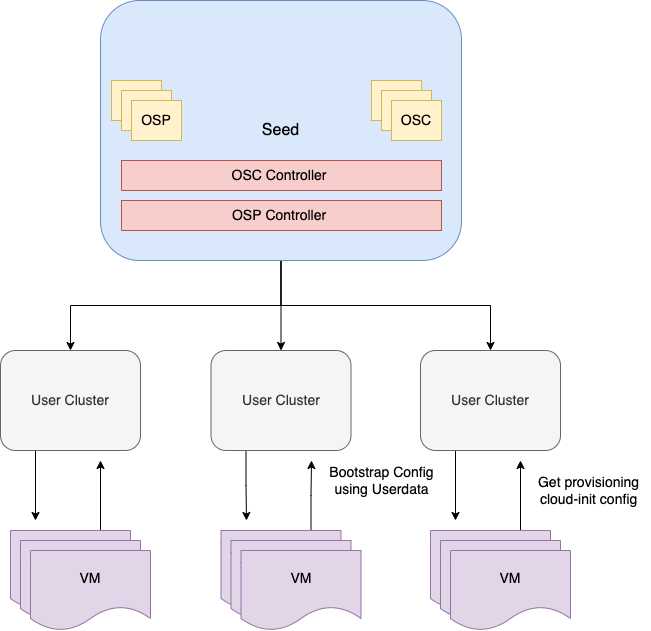[Experimental] Kubermatic operating-system-manager
Operating System Manager is responsible for creating and managing the required configurations for worker nodes in a kubernetes cluster.
Project Status
This project is experimental and currently a work-in-progress. This is not supposed to be used in production environments.
Overview
Problem Statement
Machine-Controller can be used to create and manage worker nodes in a kubernetes clusters. For each supported operating system(based on the cloud provider), a specific plugin is used to generate cloud configs. These configs are then injected in the worker nodes using either cloud-init or ignition based on the operating system. Finally the nodes are bootstrapped.
Currently this workflow has the following limitations/issues:
- Machine Controller expects ALL the supported user-data plugins to exist and be ready. User might only be interested in a subset of the available operating systems. For example, user might only want to work with
ubuntu. - The user-data plugins have templates defined in-code. Which is not ideal because code changes are required to update those templates.
- Managing configs for multiple cloud providers, OS flavors and OS versions, adds a lot of complexity and redundancy in machine-controller.
- Since the templates are defined in-code, there is no way for an end user to customize them to suit their use-cases.
- Each cloud provider sets some sort of limits for the size of
user-data, machine won't be created in case of non-compliance. For example, at the time of writing this, AWS has set a hard limit of 16KB. - Better support for air-gapped environments is required.
Solution
Operating System Manager was created to solve the above mentioned issues. It decouples operating system configurations into dedicated and isolable resources for better modularity and maintainability.
Architecture
OSM introduces the following resources:
OperatingSystemProfile
Templatized resource that represents the details of each operating system. OSPs are immutable and default OSPs for supported operating systems are provided/installed automatically by kubermatic. End users can create custom OSPs as well to fit their own use-cases.
Its dedicated controller runs in the seed cluster, in user cluster namespace, and operates on the OperatingSystemProfile custom resource. It is responsible for installing the default OSPs in user-cluster namespace.
OperatingSystemConfig
Immutable resource that contains the actual configurations that are going to be used to bootstrap and provision the worker nodes. It is a subset of OperatingSystemProfile, rendered using OperatingSystemProfile, MachineDeployment and flags
Its dedicated controller runs in the seed cluster, in user cluster namespace, and is responsible for generating the OSCs in seed and secrets in cloud-init-settings namespace in the user cluster.
For each cluster there are at least two OSC objects:
- Bootstrap: OSC used for initial configuration of machine and to fetch the provisioning OSC object.
- Provisioning: OSC with the actual cloud-config that provision the worker node.
OSCs are processed by controllers to eventually generate secrets inside each user cluster. These secrets are then consumed by worker nodes.
Air-gapped Environment
This controller was designed by keeping air-gapped environments in mind. Customers can use their own VM images by creating custom OSP profiles to provision nodes in a cluster that doesn't have outbound internet access.
More work is being done to make it even easier to use OSM in air-gapped environments.
Support
Information about supported OS versions can be found here.
Deploy OSM
- Install cert-manager for generating certificates used by webhooks since they serve using HTTPS
kubectl apply -f https://github.com/cert-manager/cert-manager/releases/download/v1.7.1/cert-manager.yaml
- Run
kubectl create namespace cloud-init-settingsto create namespace where secrets against OSC are stored - Run
kubectl apply -f deploy/crd/to install CRDs - Run
kubectl apply -f deploy/to deploy OSM
Development
Local Development
To run OSM locally:
- Either use a kind cluster or actual cluster and make sure that the correct context is loaded
- Run
kubectl apply -f deploy/crdsto install CRDs - Create relevant OperatingSystemProfile resources. Check sample for reference.
- Run
make run
Testing
Simply run make test
Troubleshooting
If you encounter issues file an issue or talk to us on the #kubermatic channel on the Kubermatic Slack.
Contributing
Thanks for taking the time to join our community and start contributing!
Feedback and discussion are available on the mailing list.
Before you start
- Please familiarize yourself with the Code of Conduct before contributing.
- See CONTRIBUTING.md for instructions on the developer certificate of origin that we require.
- Read how we're using ZenHub for project and roadmap planning
Pull requests
- We welcome pull requests. Feel free to dig through the issues and jump in.
Changelog
See the list of releases to find out about feature changes.
